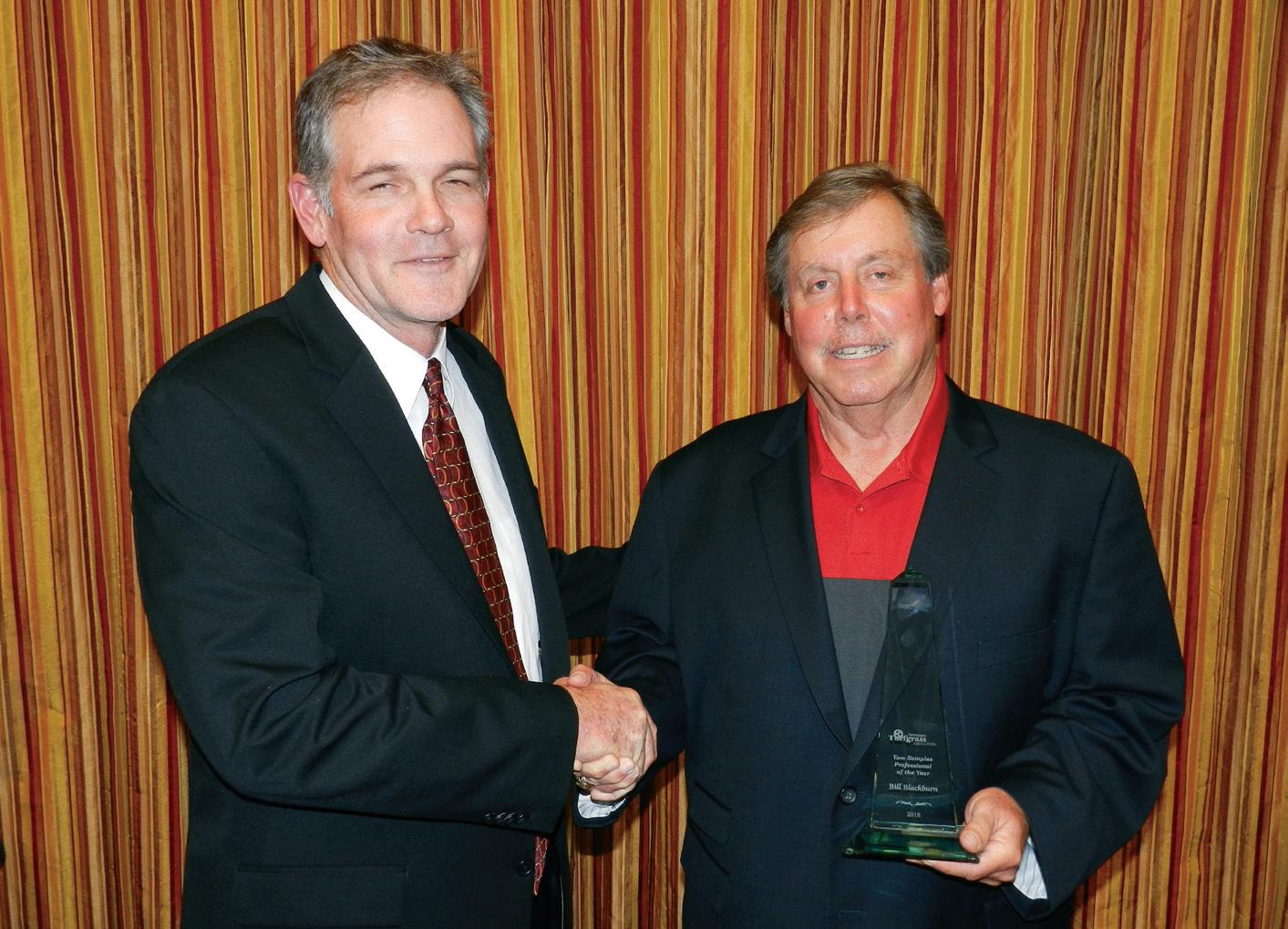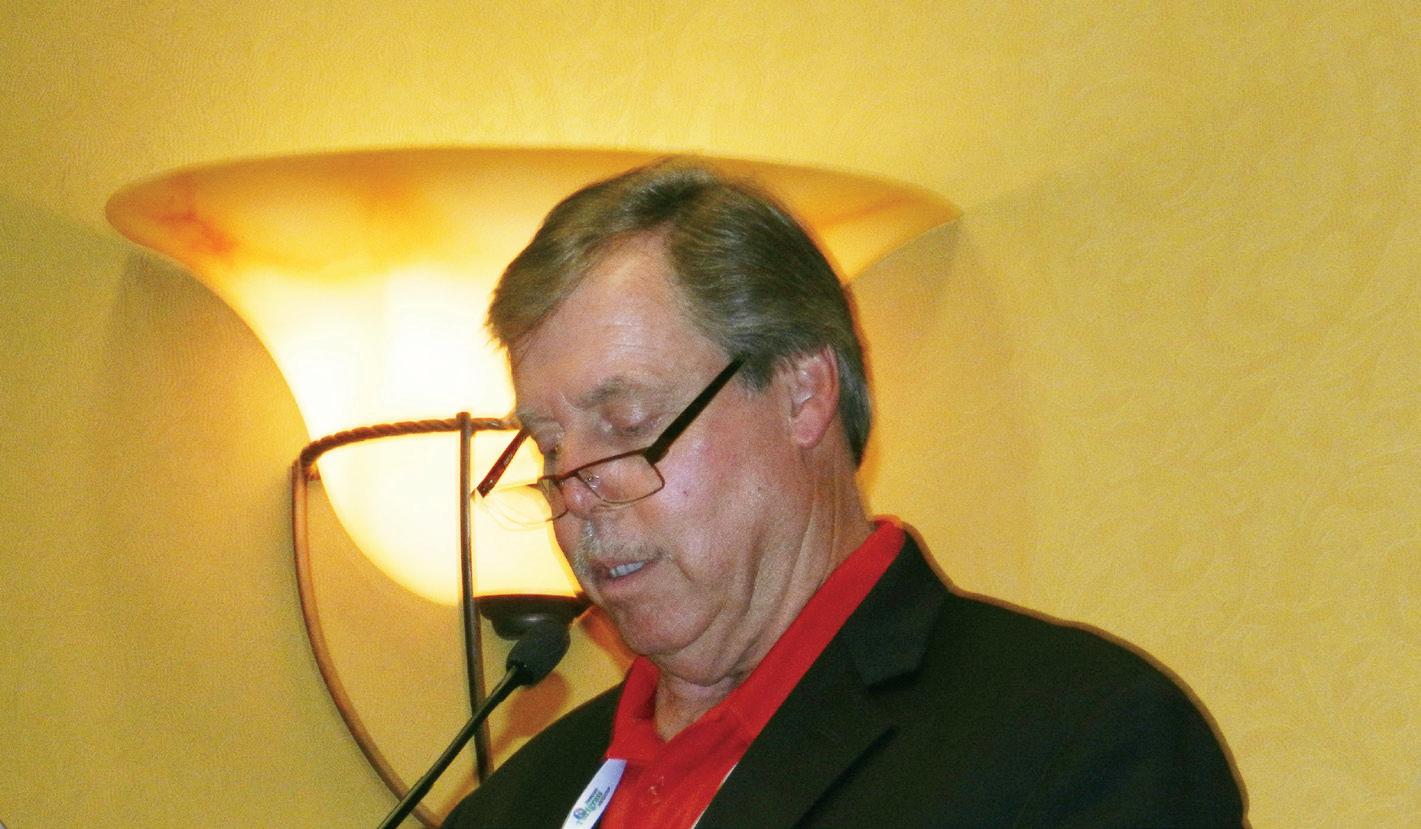
8 minute read
TTA Member Spotlight on Bill Blackburn
Tom Samples Professional of the Year Recipient
Mr. Bill Blackburn, General Manager of Tennessee Business at Smith Turf & Irrigation received the high honor of being named the recipient of the 2018 Tom Samples Professional of the Year Award. He accepted this award at the TTA Conference in Murfreesboro on January 8th.
Advertisement

Bill Blackburn accepts the Tom Samples Professional of the Year award at the TTA Conference.
This award recognizes an individual who has shown outstanding devotion of time, talent and energy to the turfgrass industry. It is named after Dr. Tom Samples, who has devoted his time and career to the turfgrass industry. Dr. Samples has been a professor at the University of Tennessee for 30-plus years, working predominantly in extension. His efforts have touched countless individuals working in golf, sports turf, sod production and lawn care in all of Tennessee’s 95 counties. We sat down with Bill to learn about his success in the industry, his background, and one unfortunate (but a little funny) incident in irrigation.

Bill Blackburn accepts the Tom Samples Professional of the Year award at the TTA Conference.
Tennessee Turfgrass Magazine: We need to know about your long and illustrious career and how you came to be honored with this award. Let’s start at the beginning. Tell us a little bit about how you got started in the industry.
Bill Blackburn: I’ll be glad to. I guess in high school, I wanted to teach and coach through my education. After an injury in high school, I gravitated a little more towards golf and enjoyed working at the little golf course at Carnton Country Club in Franklin, where I grew up. During my junior and senior year in college at Middle Tennessee State University, I had the opportunity to be the manager of a course in Murfreesboro, where Indian Hills is now, at a little course there called Fox Run Golf Course. Right after college I had the opportunity to come back to the little club in Franklin as Director of Golf and Assistant General Manager.
Two or three years after that, I wanted to really broaden that and either wanted to sell turf maintenance equipment or be involved in the golf side of it with the apparel and soft goods. An opportunity was available, but it would’ve required a move, and I just did not want to leave my roots, and I didn’t. But an opportunity in the turfgrass industry in 1985 did present itself. So I guess something like 30, 34 years ago, I began selling equipment.
My territory was eastern Tennessee. I would leave on Sunday and get in the territory, the Knoxville, Kingsport, TriCities area, a little bit of Virginia. From there, I came back to Middle Tennessee and worked this area as an outside salesperson for distribution, and after about three years of that I had the opportunity to work on a national level with a company that was owned by the Toro Company, it was called Olathe Manufacturing. After doing that up until about 1992, I had the opportunity with Smith Turf & Irrigation. I resigned from the Toro company, Olathe, and simultaneously accepted the role that I’m still in 26 and a half years later, here at STI. With all this, I never had to move. I had to travel a lot, but I never moved. Here we are, I’m 59 years old, I’m right here outside my hometown.
TTM: In your sales career over the years, have you incorporated some of that passion for coaching that you talked about? Is a lot of it educating and training, and does that fill that role of coaching for you sometimes?
BB: It IS coaching, it is promoting. Some prefer a pat on the back, some prefer that soft touch. I was one that would go through a wall for a coach if they knew that motivator. Those that did not motivate that way, I did not perform that well. You never want to break a spirit of a kid or of an employee of what they may be doing. They may be doing it totally different than what I think they should do or the way I may want them to achieve a goal, but at the end of the day if that works for them and it’s ethically correct, morally correct, and valid… then a good coach will commend that creativity and go “I think that’s probably a better idea than what I would have suggested, way to go.”
So yes, you better be a good coach, you better be a good motivator, and some do require a little kick in the seat from time to time. Typically if you understand that, then they’re gonna look at you and say “I probably deserved that,” and we move on past it and we learn from it. Yes, it’s coaching. To coach, in my humble opinion, to coach and promote children, especially, it’s a sales game. You’ve gotta get down on the kid’s level and get eyeto-eye, on your knee and tell them how great they’re doing, and “Man, that’s a great shot.” Sometimes a great shot means that it just gets airborne or they made a putt. Especially out at our little course, The Lightning Bug, for 15 years, I’ve seen little kids that are playing now collegiately. They’re out of school or in high school or middle school. I’ve had some out there in strollers!
I actually turned the water on – hit the wrong button, and I actually had a family and one of the little children’s stroller, and it pops up the irrigation. I told you earlier how I’m dangerous!
TTM: That mentality and your encouragement of others in the industry and certainly your years of service probably led to your receiving this award, the Tom Samples award. The association says that the criteria for that is “an individual who has shown an outstanding devotion of time, talent, and energy to the turfgrass industry.” And it’s obvious that you have spent that time and energy, and you’re really paying attention to everybody –from toddlers who you’ve hosed down accidentally with the irrigation system to your peers in the industry, like you talked about – those relationships that you’ve made over the years.
Tell us about how the association and those relationships and collaborations within the industry have been important in your career.
BB: Certainly they have. A moment to reference the Dr. Samples Professional of the Year. You know Dr. Samples came to Tennessee, the University in ’85, just about the time I was starting out in the field. So by being honored by the turfgrass association, that name was changed to the Dr. Tom Samples Award three or four years ago, if I remember correctly. I mean, what an honor for me. And for the association, the members, the board of directors, those that nominated and those that agreed upon my receiving the award — that goes down as the peak of the awards that perhaps I can receive in the industry. I’ve been honored in a few other things. I’m very, very grateful for that.
I became a board member – I think my first year was 1989. As I indicated, I traveled for five years, so it wasn’t like I was at all the local meetings. I never was. I may have been at a meeting in New Jersey or Hilton Head or Miami. And I went to a bunch of superintendent’s meetings and trade shows. And actually when you look back on the trade shows, the national shows and the local state associations, that’s where I kind of got involved with the TTA from the board standpoint, to kind of be the trade show chairman, and I took that seriously.
From board member, I became vice president, I never went through the secretary role, then I was vice president to my dear industry friend Lynn Ray for his twoyear tenure, then moved up to my role.
TTM: Could you offer any tips for maintaining your job and your industry roles, the association, and travel, and hobbies, and still also having a family?
BB: You better be blessed, lucky to have a bunch of friends, and I have that. Now, one would say you’re probably really lucky to have a handful of those that are true, personal friends. And I have that.
If you’re in this industry, it is vital that your neighbor down the street at XYZ facility, that those folks are able to pick the phone up and contact you. So many times I’ll find that I have some product that I have a few extra bags, or I have a piece of equipment that I’ll be glad to let you borrow and use to help, let’s just say, aerate your turfgrass, your infield, or whatever the case may be. That’s where those that are successful have that rapport with others, and it’s garnered at events like superintendent’s meetings or sports turf managers meetings or at the TTA Conference and Trade Show and educational opportunities. One must develop a relationship with the doctors and professors and those that have “been there, done that”. They could easily hunt and peck an email or text and say “Man, I’ve got a little disease here, I’m not sure, can you offer some guidance or assistance?” And those that give and receive, that’s what is special about what we do. I’m just on a different side of it, where a man’s or woman’s piece of equipment or irrigation doesn’t perform well and it’s 95 degrees, they’re in a bind. They have X number of members or parents or school board –whatever – looking down for them to get things done correctly. And sometimes it doesn’t work so hot. I get the challenge of, I’ve GOT to help that person – some way, some form, some fashion. Sometimes we are good at it, sometimes we miss the mark, but kind of going back to learning early. You do whatever you can do as long as you don’t violate ethics or morals or character. And you do whatever you can to support those that need your help, and you look back on it –they’ll support you. And that’s kind of how it works as I see it.
This article is an excerpt from Bill Blackburn’s interview with TheTurfZone. To hear the full interview, listen to the podcast at www.theturfzone.com.








